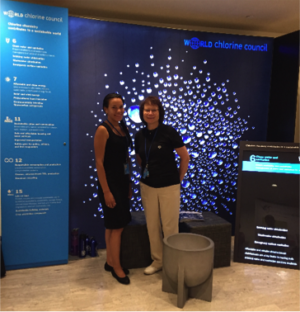
WCC Exhibit at 2018 UN High Level Political on Sustainable Development
The World Chlorine Council is honored to exhibit at the 2018 United Nations (UN) High Level Political Forum on Sustainable Development (HLPF) with partners from Water Engineers for the Americas and Haiti-Philanthropy. This year the HLPF is focused on six Sustainable Development Goals (SDGs): SDG 6, Clean Water and Sanitation; SDG 7, Affordable and Clean Energy; SDG 11, Sustainable Cities and Communities; SDG 12, Responsible Consumption and Production; SDG 15, Life on Land; and, SDG 17, Partnerships for the Goals. All of these SDGs are touched by chlorine chemistry and organizations such as the WCC.
For SDG 6, chlorine plays an especially critical role in making water safe to drink, disinfecting wastewater, and as a component of water infrastructure through PVC pipes. SDG 7 is supported by chlorine chemistry as a building block chemistry in the manufacture of key ingredients in solar panels, wind turbines, and hybrid car batteries. Chlorine chemistry helps achieve SDG 11 in its role to better transportation networks, provide affordable housing materials, and manufacture telecommunications and computer technology. Using chlorine chemistry to manufacture titanium and titanium dioxide results in less waste, conserves resources, and contributes to a circular economy, exemplifying SDG 12. Lastly, SDG 15 is aided by chlorine chemistry in the manufacturing of crop protection compounds that improve agricultural yields, reduce soil erosion, and help prevent habitat loss.
Chlorine chemistry is essential to help achieve many of the SDGs. Additionally, so are organizations like the WCC that bring people together from around the globe to discuss, partner, and further global progress toward sustainability.